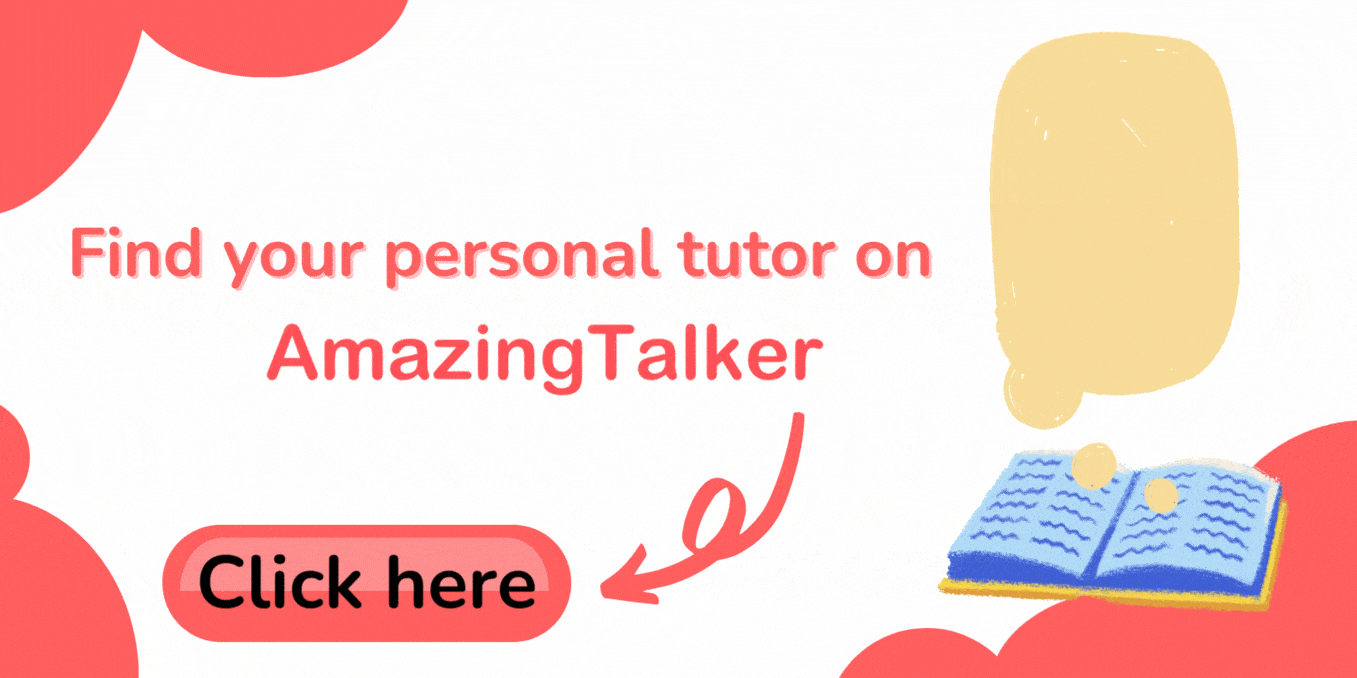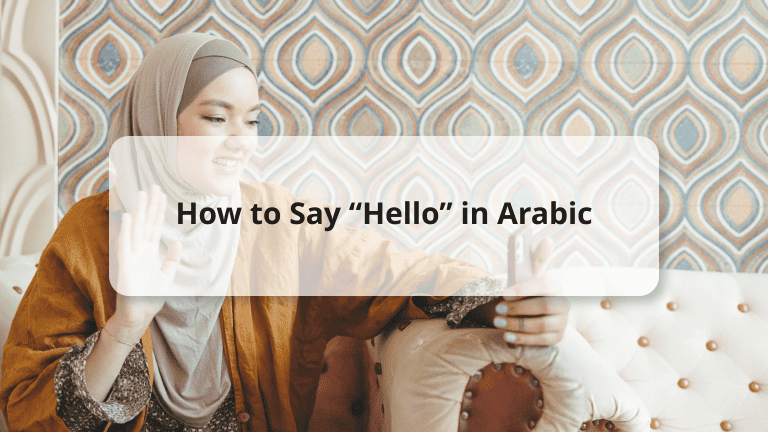Hello in Arabic: What is the most common way to say it?
If you have ever been to an Arabic-speaking country or heard someone speaking Arabic you may have realized how phonetic the language sounds, especially the Hello in Arabic. Not only is it nice to hear but also the meanings behind the greetings are quite beautiful. Many Arabic greetings have a much deeper meaning than what the phrases are typically used for, just look at the ways to say good morning in Arabic. Some phrases are influenced by God and religion, some by culture, and some by linguistic features. This article will teach you the different ways to say hello in Arabic both in formal and informal situations. Let’s get started!
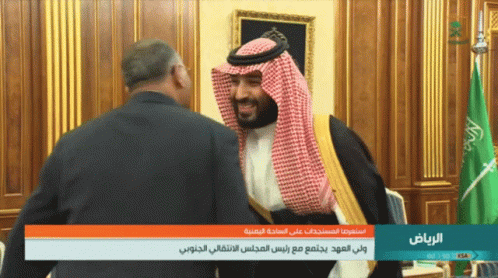
Most Common Hello in Arabic Greetings
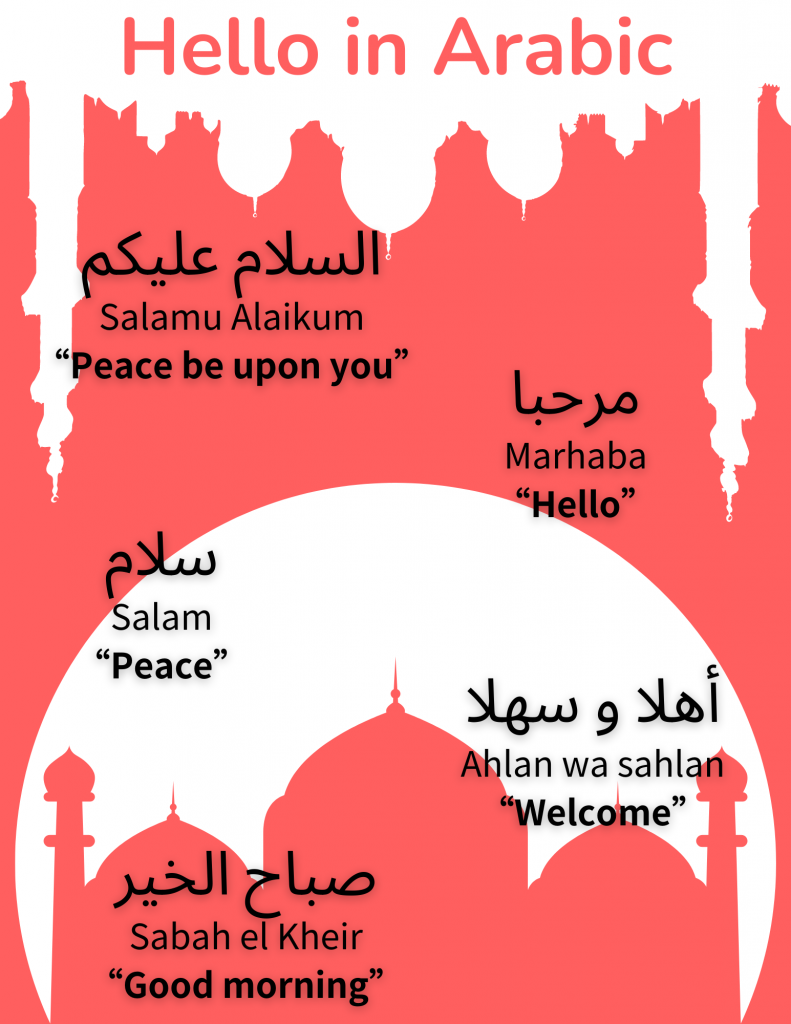
1. Salamu Alaikum – Peace be upon you – السلام عليكم
All around the globe, Salamu Alailkum is the typical Muslim formal greeting, and it is used in many Muslim-majority countries and regions, such as Pakistan and Zanzibar.
It can be used by anybody, not only Muslims as it is typically the default greeting in many nations and is also used as “hello” in English-speaking countries.
Example:
السَلامُ عَلَيكم يَا فَادِي.
(Peace be upon you, Fady.)
وعليكم سلم
(And upon you peace.)
2. Marhaba – Hello/ Welcome – مرحبا
Used like “Hi”, Marhaba might be the simplest and most common greeting in the Arabic-speaking world. It sounds nice and polite but works well for both formal and informal settings. Most Arabic-speaking nations use it. You can also respond to Marhaba with Marhaba.
3. Awafi – Health (plural form) – عوافي
Awafi is the plural of Afiya, which is used to wish someone good health and success in their endeavors. It is typically used to greet someone who is engaged in some work or activity. It essentially implies “may you have much health to keep you fit for all of the things you’re doing.”
You can reply to Awafi with another Awafi or with the longer equivalent Allah Yaeafik (May god give you good health). Awafi is also used in Iraq to tell people to enjoy their meal, similar to the French bon appétit.
Example:
عوافي
(Health.)
الله يعافيك
(May God give you health.)
4. Ya’ teek el’ afye – (May God) give you health / (May God) give you strength – يعطيك العافيه
Ya’ teek el’ afye means “May God give you health” and is a frequent greeting throughout the Levant which includes Cyprus, Israel, Jordan, Lebanon, Palestine, Syria and more. The word God is only implied but not actually included in the phrase so it can be used pretty neutrally.
Like Awafi, it’s also often used when meeting someone who’s working or doing something, implying encouragement.
5. Marahib – Many hellos/ Most Welcome – مراحب
Marahib is the plural form of Marhaba. The idea of pluralizing “hello” might sound strange for English speakers, but in Arabic using the plural form is just a way of conveying emphasizing the excitement or enthusiasm that you have in greeting people.
Example:
مراحب ، أنا أكتب لإعلامك بأني أقدر عملك.
Marahib, ‘ana ‘aktub li’iielamik bi’aniy ‘uqadir eamalaka.
(Hi, I am writing to let you know that I appreciate your work.)
6. Salam – Peace – سلام
The term salaam is an informal greeting meaning “peace” in Arabic. Think of it like a shorter and more casual version of Salamu Alaikum.
Common replies to this would also be also casual and short, like ya hala (you’re welcome), hala wa ghala (you’re welcome and dear to me), and hala wallaah (you’re extremely welcome).
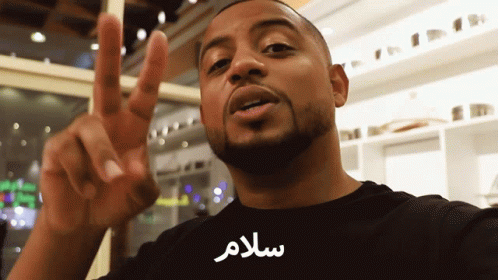
7. Kifak – How are you? – كيفك؟
The term kifak is an abbreviated informal variant of Kif Haalak the Saudi dialect phrase “how are you?” Kifak is more commonly used in the Levantine dialect. When addressing a woman, you would change it to Kifik.
When someone says this to you, you can reply with Lhamdella(thank God) or Mnih (well).
Example:
كيفك؟
(How are you?)
منِيح
(Well.)
8. Naharak sa’eed – Good day to you / Happy day to you – نهارك سعيد
Naharak sa’eed is the Fusha dialect’s version of saying “good day” to someone, but the word used literally means “happy day”. If someone says this to you, you might reply by saying Wa naharak, meaning “and your day.”
Example:
نهارك سعيد
(Good day to you.)
و نهارك
(And your day.)
9. Sho el akhbar – What’s the news? / What’s new? – شو الأخبار
Sho el Akhbar means “what’s the news” or “what’s new with you” and it’s usually used with people you are already familiar with, not so much during first meetings with strangers. It’s also a good follow-up to use after Marhaba.
10. Ahlan wa sahlan – Hello / Welcome – أهلا و سهلا
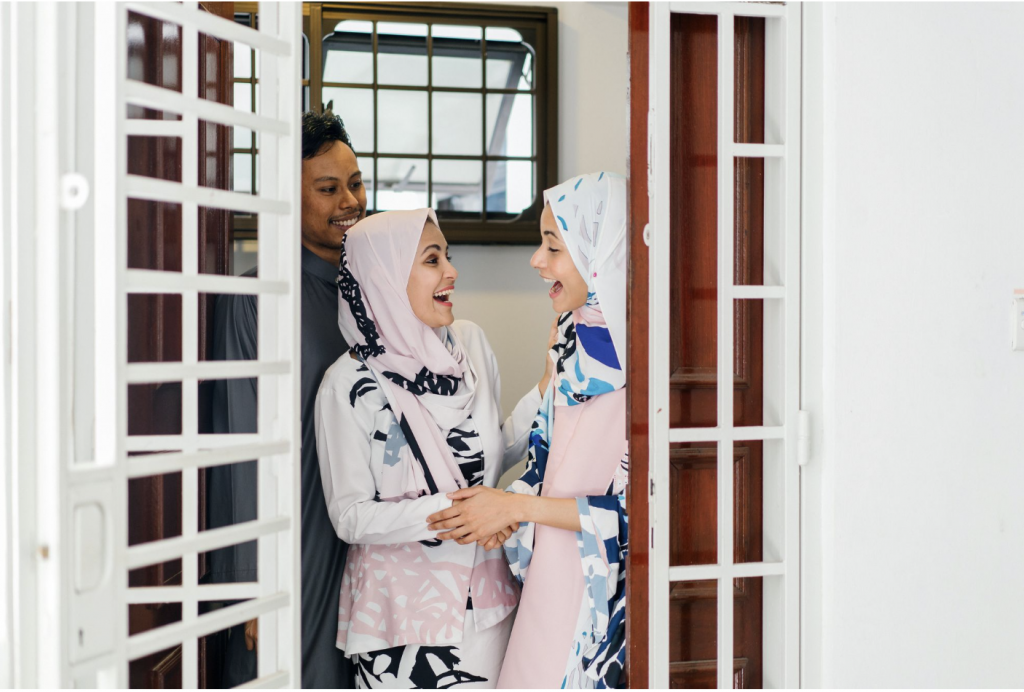
Ahlan is derived from the word ahl, meaning family. Sahlan is derived from the word sahl, meaning easy.
When you welcome someone with Ahlan wa sahlan, you are telling them that they are among family, reassuring them that they will not be regarded as a burden.
11. Kif haalak – How are you? – كيف حالك؟
Kaif is the classical Arabic word for “how.” Hala literally translates to “your condition.”
So, instead of asking, “How are you?” you are essentially asking, “How is your condition?”
If you’re talking to a woman, say Kaif Halek in colloquial Arabic or Kaif Haloki in classical Arabic.
12. Hayak Allah – May God bless you / May God preserve your life – حيَّاك الله
This Gulf dialect greeting, like Salamu Alaikum, has religious undertones, which should be pretty obvious given the word Allah.
When addressing a man, use Hayak Allah, Allah Hayaki when addressing a woman, and when addressing a group, use Hayakum Allaah.
Example:
حيَّاك الله
(May God bless you.)
الله يحييك
(May God bless you.)
13. Izayyak – How are you? – ازيك؟
This is a uniquely Egyptian way to ask someone how they are.
Izayyak is “how are you?” in Egyptian dialect, fewer people in Arab speaking countries understand the Egyptian dialect, but they will definitely understand Izayyak and recongize that your studied Egyptian Arabic.
When speaking to a man, use Izayyak and Izayyik when speaking to a woman.
Hello in Arabic at Different Times of the Day

1. Sabaho – his morning – صباحو
Thought it literally translates to “his morning”, Sabaho is short for Sabah el Kheir and is an informal or casual way of greeting someone good morning in the Syrian dialect. Sabaho is a unisex greeting in spite of the “-o” suffix at the end being masculine, because in this case, it does not refer to the speaker or receiver but to the word Kheir, the “good” in “good morning” which is omitted.
2. Sabah el Kheir – Good morning / Morning of Goodness – صباح الخير
This is the conventional and complete expression for “good morning,” and it may be used in formal contexts with strangers as well as with friends.
You can reply to this with another Sabah el Kheir or add additional poetic flavor with Sabah el Noor.
3. Sabah el Noor – Light Morning / Morning of Light – صباح النور
“Light morning” doesn’t really sound like anything meaningful to an English speaker, but we can understand Saba el Noor as something like “May your day be full of light.”
4. Masa el Kheir – Good Afternoon/Evening – مساء الخير
There is no unique greeting for evening and afternoon in Arabic, so as soon as it’s past noon, we just use Masa for both.
We already learned earlier that Kheir means good and Sabah means morning, so all we have to do is replace Sabah with Masa and we get Masa el Kheir for “good evening‘ and “good afternoon.”
5. Masa el Noor – Light Evening/Afternoon / Afternoon/Evening of Light – مساء النور
This is exactly the same as Sabah el Noor but for Masa the afternoon/ night. When someone greets you Masa el Kheir you can greet them back with Masa el Noor.
6. Yaseed sabahk – Have a happy morning – يسعد صباحك
This can be used formally and informally. You can reply with a simple Wa sabahk which means “and your morning.”
This is another one of those greetings that changes depending on whom you’re talking to:
Yaseed Sabahk is used when speaking to a man; Sabahek’ is used when speaking to a woman and Sabahkom’ is used when you are greeting 2 or more people.
7. Yaseed masak – Have a happy evening – يسعد مساك
Just like above, this can be used formally and informally. You can reply with a simple Wa masak which means “and your evening/afternoon.”
This is also another one of those greetings that changes depending on whom you’re talking to:
Yaseed Masak is used when speaking to a man; Yaseed Masake’ is used when speaking to a woman and Yaseed Masakom’ is used when you are greeting 2 or more people.
How to Answer the Phone in Arabic
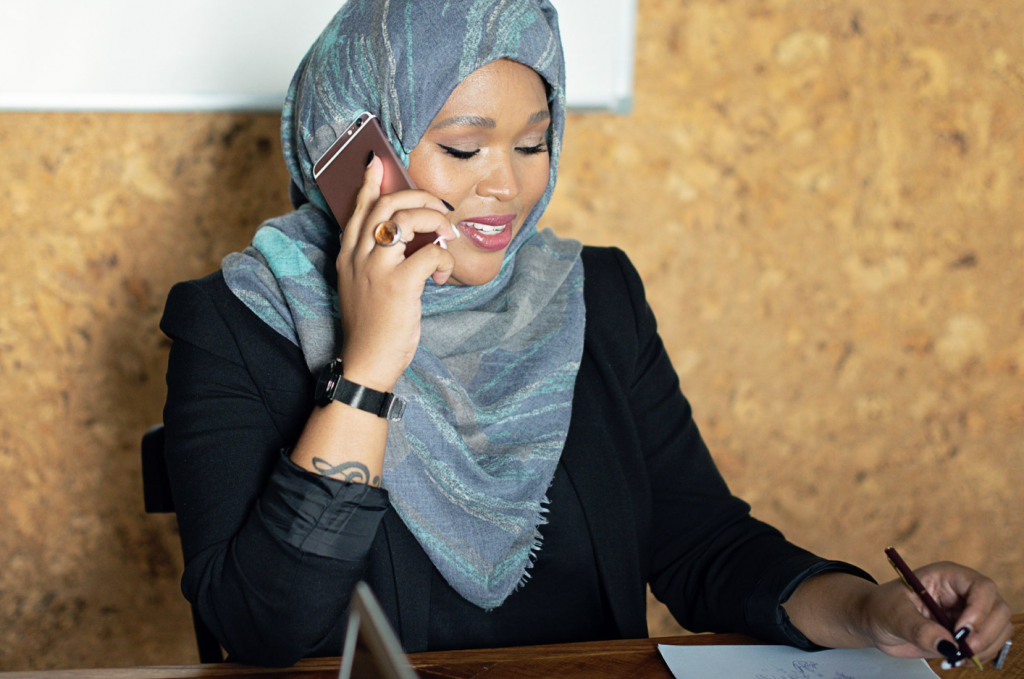
Alo – Hello – ألو
On the telephone most people just say Alo, a transliteration of Hello in Arabic, pronounced like how a French person would say it.
Hello in Arabic Greetings are Gender-based
Greetings in Arabic culture are usually accompanied by hugs, kisses, handshakes, or bows. However, the customary gesture can vary greatly depending on the country, gender, and relationship. Most males friends and relatives would kiss each other on the cheek, or touch noses but the number of touches or kisses and which cheek vary according to the country and closeness of the relation. Women generally give each other hugs. Two people of the opposite gender generally do not come into contact at all, unless in some cases, the woman first extends her hands, and then a handshake is allowed.
As a general rule, you should only give a verbal greeting to people of the opposite gender who are wearing Islamic dress.
السلام عليكم Salamu Alailkum is the typical Muslim formal greeting, and it is used in many Muslim-majority countries and regions. It means “May peace be upon you.”
Marhaba might be the simplest and most common greeting in the Arabic-speaking world. It sounds nice and polite but works well for both formal and informal occasions.

Greet Your Friends with Hello in Arabic
Whew! Yep, all that was just to learn to say hello. And that’s only the start of a conversation. What if you learned how to say hello in 100 languages?
If you really want to have meaningful discussions in Arabic, why not try learning with an Arabic tutor to walk you through this or any other topic in the Arabic language? Getting a tutor will benefit you in the long run! AmazingTalker has an entire plethora of tutors that can help your language learning needs. You can even customize your lessons to suit your needs and even organize these lessons according to your schedule! All of this and more, only at AmazingTalker.
